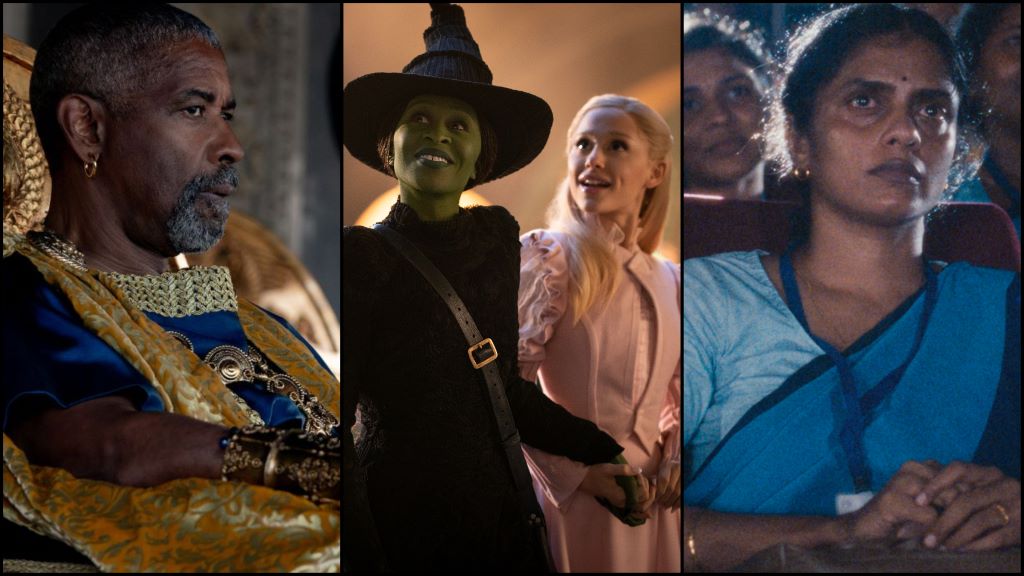Reviews include Superman, Apocalypse in the Tropics, and To a Land Unknown.
TFCA Friday: Week of Nov. 22 – Glicked Edition!
November 22, 2024

Welcome to TFCA Friday, a weekly round-up of film reviews and articles by TFCA members.
In Release this Week
All We Imagine as Light (dir. Payal Kapadia)
“The film celebrates womanhood, showing how each needs to support another in the face of male-related problems. In unity, females can face the world with strength and resilience—great shots of [Mumbai] life and the beautiful Indian beach areas,” says Gilbert Seah at Afro Toronto.
“Kusruti’s performance radiates warmth as Kapadia observes the actor riding the train and just vibing to the city’s pull. All We Imagine as Light is a delicate film that slowly and methodically washes over you and warms the heart,” writes Pat Mullen at That Shelf. Mullen also speaks with Kapadia for POV Magazine and learns how her documentary roots inform her portrait of city life. “In this film, I wanted to make a very proper scripted film,” says Kapadia. “But of course that doesn’t always happen. While shooting, I did a lot of interviews with people randomly, which was not in the script. I had written a proper script with proper scenes, but then all the nonfiction that I was attracted to started seeping into the film. It has elements of nonfiction, but a lot of very constructed fiction. The story itself led me to the form. It starts more vérité style and goes into something dream-like.”
Gladiator II (dir. Ridley Scott)
“In the area of action, Gladiator II is a Roman orgy of excess,” observes Eli Glasner at CBC. “Killer baboons? Check. A soldier riding a battle-armoured rhino? Check. One impressive set piece features the gladiators pitted against Roman soldiers in a naval battle in shark-infested waters. Instead of this being a forum to appreciate Lucius’s leadership, Ridley Scott muddies the water with a barrage of quick edits, making it impossible to appreciate each ship’s location, and thereby Lucius’s strategy.”
“Mescal… cuts a fine figure as Lucius,” says Chris Knight at Original Cin. “He clearly bulked up for the role, and the hair and makeup department was obviously working overtime to give him what I believe the Romans referred to as “V o’clock shadow.” Not unlike his father, Maximus (who gets several shoutouts in flashback), his skill in the arena is matched only by his moral rectitude. He’s easy to root for, especially when set against the feckless twin emperors and the more toadying members of the Senate.”
“Admittedly, it works some of the time, whenever the tireless Lucius is inside the Colosseum fighting impossible animals and human combatants, spilling more blood and severing more heads than in the first Gladiator,” writes Peter Howell at the Toronto Star. “As before, ambition, grief and vengeance are the driving emotions. Mescal lacks the brawniness of Crowe’s character but he’s every bit as spirited.”
“Scott has gone to great lengths to recreate Rome during the Empire—and it works,” says Marc Glassman at Classical FM. “Gladiator II has the look and feel of an epic. But the plot comes unhinged towards the end. Perhaps Scott became overly sentimental about the earlier film and, in particular, its star and character, Russell Crowe’s Maximus. Just when the film moves towards a well-earned denouement, Scott pirouettes away to go for an over-the-top tear-jerker of an ending. It’s not necessary and undermines the film.”
“It took a while before this sequel go to the screens. Gladiator II is a gore violent blood fest with lots of action set pieces in which heads and upper torso are dismembered,” notes Gilbert Seah at Afro Toronto. “Story-wise, the film is a disappointment with a predictable plot and clichéd characters. At a running time of 2 hours and 20 minutes, the film moves fast, but not without flaws including a few out of step sequences.”
“Washington gives a baddie for the ages in Gladiator II as the power-hungry slave turned politician Macrinus. He steals every scene of the Ridley Scott’s sequel to the Oscar winning 2000 epic. But his performance is just one of many ways in which Scott’s flick ups the ante,” says Pat Mullen at That Shelf. “Gladiator II follows Lucilla’s long lost son, Lucius, 20 years where the story left off. Played by Paul Mescal in a commanding, yet sensitive performance, Lucius returns to Rome when the African colony he defends is conquered by the Roman Empire.”
GT Max (dir. Olivier Scneider)
“There is nothing really excitingly new in terms of plot, in fact the storytelling is predictable though well stretch put with many characters, the film is solid fast time waster that should appeal to dirt motorbike speed fans as well to new converts,” says Gilbert Seah at Afro Toronto. “The film is fast and furious and he chase scenes, particularly around Paris, with immediate recognizable street and walkaways by the Seine is what makes the movie especially engaging.”
Joy (dir. Ben Taylor)
“The film is a touching story of medical history that is given a human touch making it emotional and moving. The film is told from the point of view of Jean Purdy, marvellously portrayed by New Zealand actress, Thomasin McKenzie,” writes Gilbert Seah at Afro Toronto. “The film’s most moving part is Nighy as Dr. Edwards plays the piano with his wife seated beside him. She says she was looking forward to a retirement with wine and holidays to which he retorts: “So am I. But this is something that matters, at which he continues playing the piano. Director Taylor is to be commended for the way he keeps the momentum of the film’s interest from start to finish.”
Maria (dir. Pablo Larraín; Nov. 27)
“Maria is pretty much the same as Larraín’s other two films of his trilogy Jackie and Spencer, with elaborate and meticulously orchestrated production set pieces but empty vehicles on the whole where the sum of the parts do not really add up to a strong narrative or purpose,” admits Gilbert Seah at Afro Toronto.
“It’s a testament to Jolie that she tackles a part that many cinephiles, this one included, long waited for Meryl Streep to play in what was reported to be the actor’s most coveted roles,” writes Pat Mullen at That Shelf. “And as a critic who considers Streep the finest screen actor, I must extend the highest compliment possible: it’s hard to imagine any actor exceeding the feat that Jolie performs here.”
Maybe Baby 2 (dir. Barbara Topsøe-Rothenborg)
“The film tackles a few motherly issues such as balancing work and bringing up a baby and how to rear a child that is either too active or a bit too smart for its age,” sighs Gilbert Seah at Afro Toronto. “The film gets a bit sentimental at the end and it is clear the filmmakers are trying a bit too hard to make the family comedy work.”
Never Look Away (dir. Lucy Lawless)
“Admiring journos shot extensive footage of [Moth] taking extraordinary risks, admiring men talked about their attraction to her strength and about the life altering events that lay ahead of her,” writes Anne Brodie at What She Said. “Moth’s jaw was shot off in the notorious Sniper Alley in Sarajevo. Think that stopped her? A hero, a truthteller and one of a kind, Moth’s legacy is here available for all to witness. Extraordinary.”
“Lawless’s portrait of Moth is one of fierce resilience. Her former lovers and colleagues speak of a woman who wasn’t afraid of missiles and bombs, preferring to put herself in the way of danger so the world could witness where history was made,” says Rachel West at That Shelf. “Long before every phone had a camera and the 24/7 news cycle wasn’t at your fingertips, the footage Moth sent back to her news bureau was nothing short of remarkable.”
“In her directorial debut, actor Lucy Lawless reveals the fearlessness of a fellow Kiwi woman,” says Gilbert Seah at Afro Toronto. “The documentary ends with Moth being diagnosed with colon cancer and dying in the arms of an old friend fellow CNN cameraman at the age of 59. The film’s ending minutes are spent concluding on the courage of the woman and the large impact her journalism had on stopping wars.”
“Through Moth’s story and powerful images, Never Look Away delivers a timely portrait that speaks to the urgency of supporting quality journalism, but also of valuing the heroism behind every story,” writes Pat Mullen at POV Magazine. Mullen also speaks with director Lucy Lawless about bringing Moth’s story to screen: “If death was coming for her one more time, she’s going to film it as it comes to take her out,” says Lawless. “There is every chance that she could have been obliterated in that building. Her camera was her mainstay and it was her weapon against death. Didn’t run away though.”
The Piano Lesson (dir. Malcolm Washington)
“It takes a special kind of actor to take Wilson’s writing and elevate it,” writes Kathleen Newman-Bremang at Refinery 29. “Viola Davis did it with Fences. Danielle Deadwyler does the same in The Piano Lesson. The comparison to Davis’s Oscar-winning performance isn’t hyperbole, and neither is the assertion that Deadwyler is even better. Yeah, I said it. No disrespect to the GOAT Viola Davis but the best female character Wilson ever wrote is Berniece and Deadwyler rises to the challenge of the material.”
Wicked: Part One (dir. Jon M. Chu)
“The costumes are stunning, the sets and décor out of this world, the money is all onscreen – $145M in eye candy,” notes Anne Brodie at What She Said. “Cynthia Erivo and Ariana Grande bring their wickedly wonderful voices to the showtunes as Elphaba, the brainy, reserved green skinned outsider and Galinda, the seemingly superficial, vain and brainy, Elphaba’s nemesis turned best friend. Being green has taught Elphaba that the world can be cruel and prejudiced.”
“And while it’s true that much of Wicked is mainly good fun—turning a classic tale upside down—there is a core of a genuine story, with talking animals having their speech taken away, and only the ‘Wicked’ Elphaba there to defend their rights to have a dignified life,” notes Marc Glassman at Classical FM. “That, accompanied by the fact that everyone takes an instant dislike to Elphaba because she has green skin, points to the one serious idea in the franchise: it’s not healthy to be a racist.”
“The film’s production design is not a delight, being more shopping mall than cinema marvel. The cinematography by Alice Brooks seems overexposed, with lens flares that are a distraction rather than an artistic flourish,” observes Peter Howell at the Toronto Star. “More of a problem is the strategy by Chu (Crazy Rich Asians) and the film’s producers to make Wicked a two-parter (the second arrives at Christmas 2025). This means stretching a story that in its Broadway version ran in its entirety for less than the film’s bladder-challenging 160 minutes.”
“Erivo’s Elphaba is demure, kind, and gifted. But in the eyes of others, including her own father, Elphaba is hideous because of her lizard-green skin. Playing to Elphaba’s strength and her weaknesses, Erivo depicts a woman resigned to her lot in life as the only ‘green-skinned’ witch to set foot in Oz,” says Thom Ernst at Original Cin. “Grande shines in her first major film role as Glinda, The Good Witch of the East. Grande’s Glinda is coquettish, whimsically self-centered, and inadvertently shallow; qualities that might sink any other character but are uplifted by Grande’s easy charm and playfulness.”
“Wicked, for its part, is not trying to trick anybody into liking it by hiding what it really is — this is a refreshingly over the top production from tip to tail. That’s no doubt helped by the incredible chops of its stars: Erivo and Grande get more than a few chances to show off their incredible vocal range and power,” writes Jackson Weaver at CBC. “The visuals, bizarrely both flat and overexposed, feel like Chitty Chitty Bang Bang with misguided corporate backing, while Grande and Erivo’s occasional tendency to cap songs with unnecessary Mariah Carey runs reads like a hollow pop version of Jesus Christ Superstar.”
“The eclectic cast gives the film political correctness with an African American Erivo, a Malaysian Chinese Yeoh and even a Brit who plays Prince Charming. The film is also too obvious in its message on minorities,” says Gilbert Seah at Afro Toronto. “Here, the animals are the minorities that are caged and eventually lose their ability to speak.”
“[O]ne of the most euphorically great movie musicals in years,” says Pat Mullen at That Shelf, who gets some words from Cynthia Erivo, Ariana Grande, and Jonathan Bailey on bringing Wicked to life. “Knowing what it feels like to be an outsider, knowing what it feels like to be different, to be the one on the outside, to be a Black queer woman playing this green woman has its parallels, I know what it is to not necessarily feel like the world makes space for you,” says Erivo. “I think we arrived right on time. I think it’s something that we all desperately need: connection, friendship, the capacity for change, and the capacity to accept others and their differences.”
Witches (dir. Elizabeth Sankey)
At POV Magazine, Pat Mullen speaks with director Elizabeth Sankey about exploring parallels between cinematic depictions of witchcraft and mental health while assembling a coven of women to discuss their experiences with postpartum depression. “I think the willingness was also there because they knew that I was going to be sharing my story too,” says Sankey. “I wasn’t an outsider coming in and saying, ‘Tell me about the terrible thoughts you had.’ I had been through it and I was going to be sharing more of the dark stuff than anyone else.”
A Festival of Festival Coverage
At Original Cin, Thom Ernst previews Toronto’s Blood in the Snow Festival devoted to horror films like She Who Must Burn. “One of the coolest things about the Blood in the Snow Film Festival is its commitment to showcasing homegrown talent,” writes Ernst. “Every film here is proudly Canadian, highlighting the country’s rich and diverse film scene. This year, the festival is packed with an exciting mix of shorts and feature films.”
TV Talk/Series Stuff
At What She Said, Anne Brodie praises the return of Bad Sisters: “There’s no show comparable to it, a compelling thriller/murder mystery/celebration of subversive sisterhood!” Meanwhile, the documentary The Body Politic offers a wake-up: “We meet local activists who embrace Scott’s vision, fired by its simplicity and beauty. This doc could well be inspiration to other violence-plagued cities,” writes Brodie. And Families Like Ours brings chills: “The miniseries apocalyptic feel is terrifying – we know some island countries are already sinking, as climate change, caused by us, continues to alter our planet, perhaps towards extinction,” says Brodie. Audiences can recover with a laugh thanks to Jim Gaffigan’s The Skinny: “witty, relatable observations on family life and being svelte for the first time,” notes Brodie.



